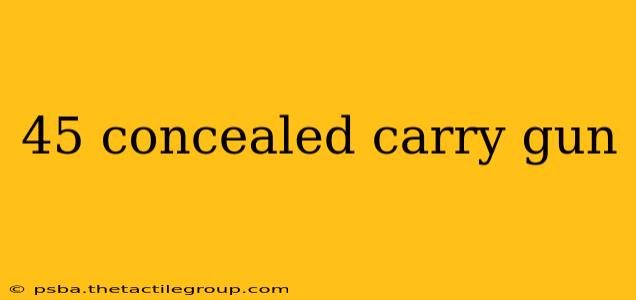Choosing a concealed carry handgun is a deeply personal decision, demanding careful consideration of numerous factors. While the sheer variety can be overwhelming, the .45 ACP caliber remains a popular choice for many, offering a potent stopping power often favored for self-defense. This guide explores the nuances of carrying a .45 ACP pistol, addressing its advantages, disadvantages, and helping you determine if it's the right fit for your needs.
The Allure of the .45 ACP: Power and Stopping Power
The .45 ACP (Automatic Colt Pistol) cartridge has a long and storied history, renowned for its substantial stopping power. Its larger diameter bullet, compared to 9mm or .40 S&W, delivers significantly more energy upon impact. This increased energy transfer is often cited as a key advantage for self-defense scenarios, potentially leading to a faster incapacitation of a threat. This is a crucial factor for many choosing a concealed carry weapon, prioritizing stopping power above all else.
Advantages of a .45 ACP Concealed Carry Pistol:
- Stopping Power: The undeniable advantage. The larger bullet diameter and heavier weight translate to greater energy transfer, potentially leading to a faster neutralization of a threat.
- Felt Recoil: While recoil is subjective, many experienced shooters find the .45 ACP's recoil manageable, particularly in heavier framed pistols.
- Bullet Performance: .45 ACP ammunition offers a wide range of options, including jacketed hollow points (JHPs) designed for optimal expansion and tissue damage in self-defense situations.
The Challenges of Carrying a .45 ACP: Size and Weight
Despite its advantages, carrying a .45 ACP presents certain challenges. The larger cartridge necessitates a larger firearm, impacting concealability and comfort.
Disadvantages of a .45 ACP Concealed Carry Pistol:
- Size and Weight: .45 ACP handguns are generally larger and heavier than their 9mm or .40 S&W counterparts, making them more challenging to conceal comfortably, especially for individuals with smaller frames. This increased weight can also lead to fatigue during prolonged carry.
- Recoil (for some): While manageable for many, the increased recoil can be a significant factor for those with less shooting experience or those with smaller builds, potentially impacting accuracy and follow-up shots.
- Capacity: Magazine capacity tends to be lower than in smaller calibers, potentially limiting the number of rounds available in a self-defense situation.
- Ammunition Cost: .45 ACP ammunition can be more expensive than smaller calibers, adding to the ongoing cost of practice and training.
Choosing the Right .45 ACP for Concealed Carry: Key Considerations
Selecting a suitable .45 ACP for concealed carry requires careful consideration of several key factors:
1. Size and Weight: The Goldilocks Principle
Find a balance between sufficient stopping power and comfortable concealability. Consider the size of your frame and your preferred carry method (inside the waistband, outside the waistband, pocket carry). A smaller, lighter .45 ACP might compromise on capacity, whereas a larger one might prove difficult to conceal.
2. Ergonomics and Grip: Comfort is Key
A comfortable grip is crucial for both accuracy and consistent shooting. Consider the pistol's ergonomics and how it fits your hand. Test-fire different models to find the one that feels most natural and comfortable.
3. Reliability: A Gun You Can Count On
Choose a reputable manufacturer known for producing reliable firearms. Thorough testing and maintenance are essential to ensure your handgun functions flawlessly when needed.
4. Ammunition Selection: The Right Round for the Job
Selecting appropriate ammunition is critical for self-defense. Jacketed hollow points are generally preferred for their expansion and tissue damage characteristics.
Conclusion: Is a .45 ACP Right for You?
The .45 ACP offers undeniable stopping power, a compelling argument for its use in self-defense. However, its larger size and weight demand careful consideration. Ultimately, the choice depends on your individual needs, physical capabilities, and comfort level. Thorough research, professional guidance, and extensive practice are crucial before carrying any firearm for self-defense. Always prioritize safety and responsible gun ownership. Consult with a qualified firearms instructor to determine the best firearm and training regimen for your specific circumstances.

